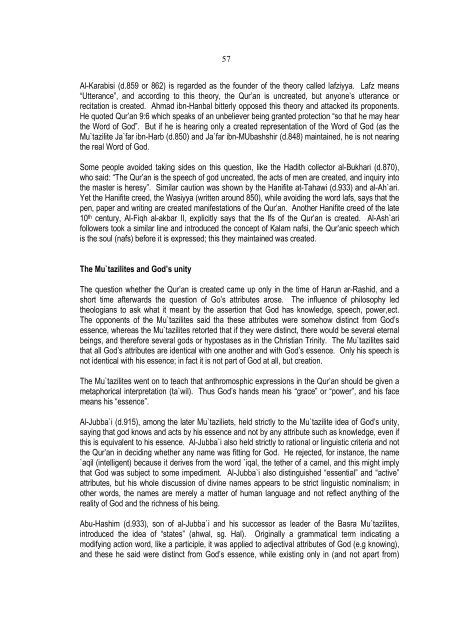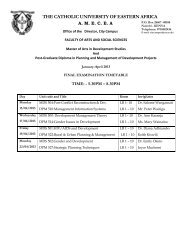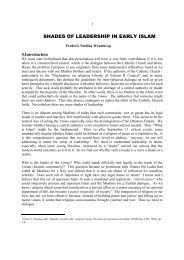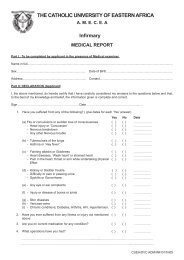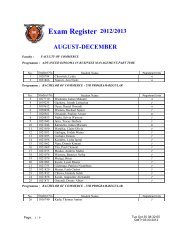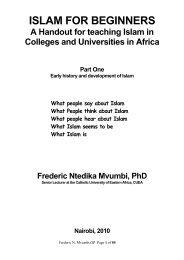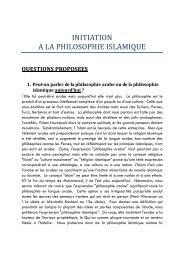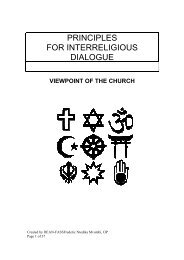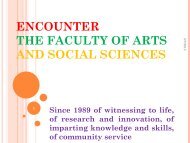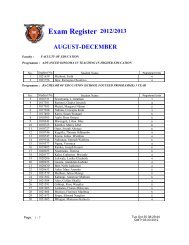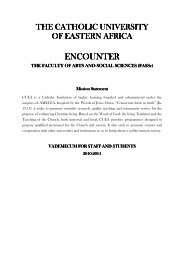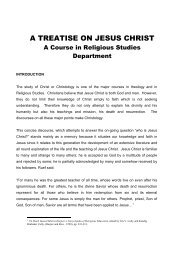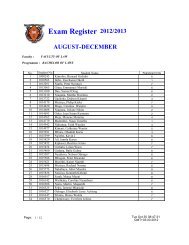INTRODUCTION TO ISLAMIC THEOLOGY.pdf - CUEA
INTRODUCTION TO ISLAMIC THEOLOGY.pdf - CUEA
INTRODUCTION TO ISLAMIC THEOLOGY.pdf - CUEA
Create successful ePaper yourself
Turn your PDF publications into a flip-book with our unique Google optimized e-Paper software.
57Al-Karabisi (d.859 or 862) is regarded as the founder of the theory called lafziyya. Lafz means“Utterance”, and according to this theory, the Qur’an is uncreated, but anyone’s utterance orrecitation is created. Ahmad ibn-Hanbal bitterly opposed this theory and attacked its proponents.He quoted Qur’an 9:6 which speaks of an unbeliever being granted protection “so that he may hearthe Word of God”. But if he is hearing only a created representation of the Word of God (as theMu`tazilite Ja`far ibn-Harb (d.850) and Ja`far ibn-MUbashshir (d.848) maintained, he is not nearingthe real Word of God.Some people avoided taking sides on this question, like the Hadith collector al-Bukhari (d.870),who said: “The Qur’an is the speech of god uncreated, the acts of men are created, and inquiry intothe master is heresy”. Similar caution was shown by the Hanifite at-Tahawi (d.933) and al-Ah`ari.Yet the Hanifite creed, the Wasiyya (written around 850), while avoiding the word lafs, says that thepen, paper and writing are created manifestations of the Qur’an. Another Hanifite creed of the late10 th century, Al-Fiqh al-akbar II, explicitly says that the lfs of the Qur’an is created. Al-Ash`arifollowers took a similar line and introduced the concept of Kalam nafsi, the Qur’anic speech whichis the soul (nafs) before it is expressed; this they maintained was created.The Mu`tazilites and God’s unityThe question whether the Qur’an is created came up only in the time of Harun ar-Rashid, and ashort time afterwards the question of Go’s attributes arose. The influence of philosophy ledtheologians to ask what it meant by the assertion that God has knowledge, speech, power,ect.The opponents of the Mu`tazilites said tha these attributes were somehow distinct from God’sessence, whereas the Mu`tazilites retorted that if they were distinct, there would be several eternalbeings, and therefore several gods or hypostases as in the Christian Trinity. The Mu`tazilites saidthat all God’s attributes are identical with one another and with God’s essence. Only his speech isnot identical with his essence; in fact it is not part of God at all, but creation.The Mu`tazilites went on to teach that anthromosphic expressions in the Qur’an should be given ametaphorical interpretation (ta`wil). Thus God’s hands mean his “grace” or “power”, and his facemeans his “essence”.Al-Jubba`i (d.915), among the later Mu`taziliets, held strictly to the Mu`tazilite idea of God’s unity,saying that god knows and acts by his essence and not by any attribute such as knowledge, even ifthis is equivalent to his essence. Al-Jubba`i also held strictly to rational or linguistic criteria and notthe Qur’an in deciding whether any name was fitting for God. He rejected, for instance, the name`aqil (intelligent) because it derives from the word `iqal, the tether of a camel, and this might implythat God was subject to some impediment. Al-Jubba`i also distinguished “essential” and “active”attributes, but his whole discussion of divine names appears to be strict linguistic nominalism; inother words, the names are merely a matter of human language and not reflect anything of thereality of God and the richness of his being.Abu-Hashim (d.933), son of al-Jubba`i and his successor as leader of the Basra Mu`tazilites,introduced the idea of “states” (ahwal, sg. Hal). Originally a grammatical term indicating amodifying action word, like a participle, it was applied to adjectival attributes of God (e.g knowing),and these he said were distinct from God’s essence, while existing only in (and not apart from)


